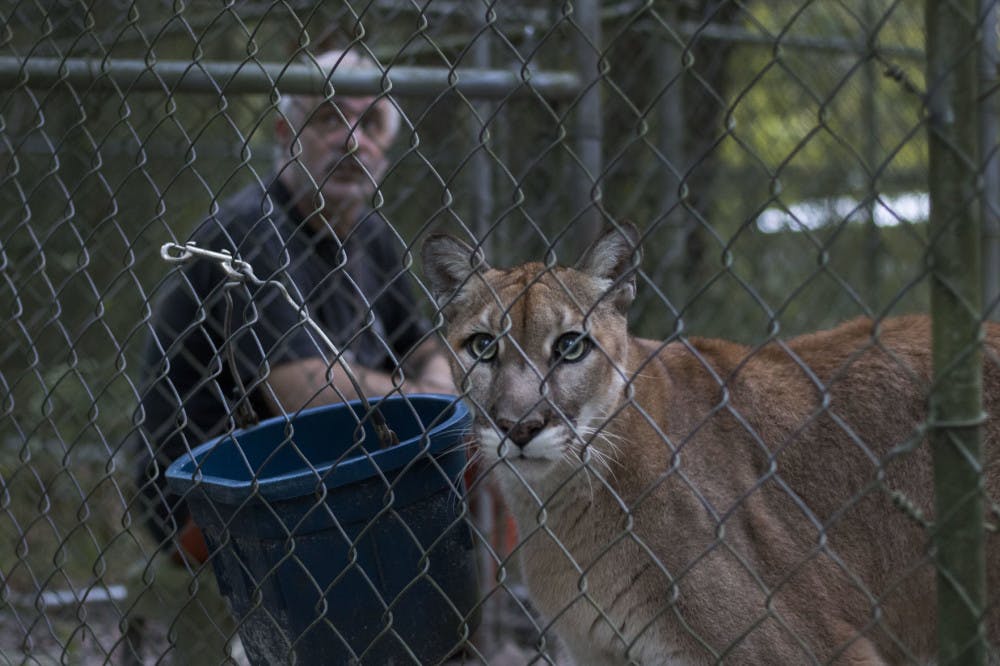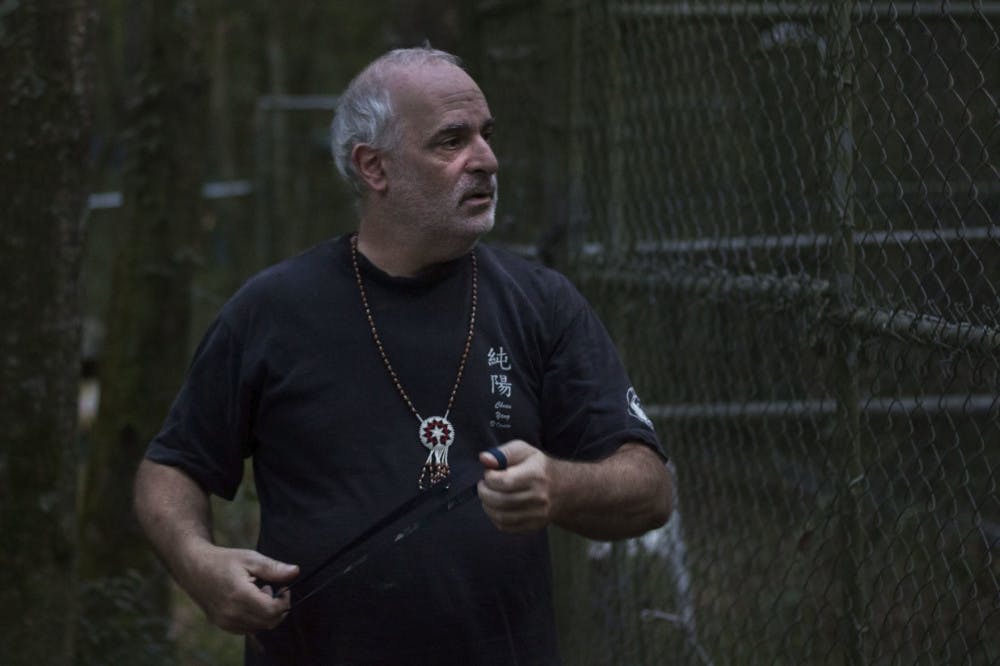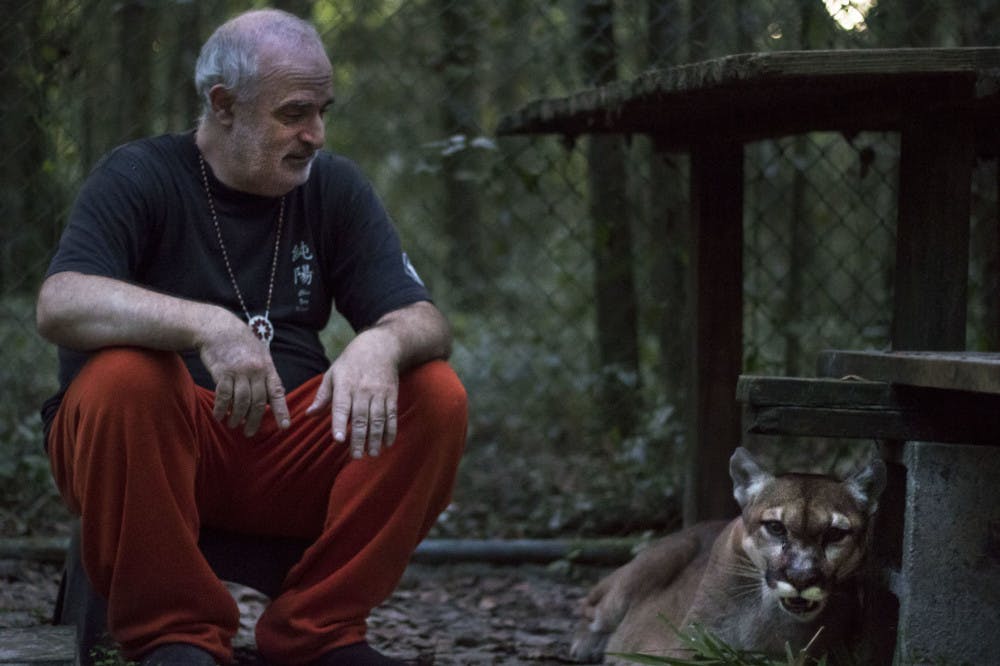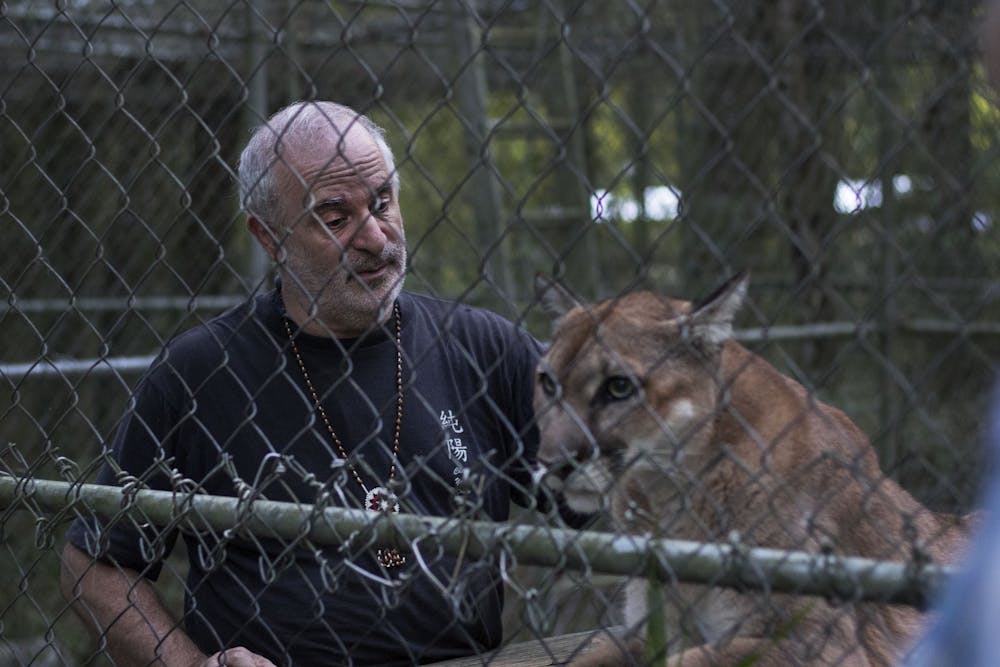In a fenced enclosement adjacent to a mobile home, an 80 pound cougar slowly inched closer to Bruce Capin.
Dressed in bright orange sweatpants and a black T-shirt with a tiger printed on the back, Bruce Capin crouched down.
“Talisa,” he called.
He extended his arms, and Talisa trotted into his embrace, immediately nuzzling and licking his face.
Erika Capin watched from the other side of the chain-linked fence, as her husband calmed the purring cat down, stroking its back and whispering “I love you.”
Bruce and Erika Capin are the owners and operators of Yahtok’ya Animal Sanctuary in Alachua — a home for mistreated or neglected big cats, specifically cougars, to live out the rest of their lives.
In Florida, cougars are commonly referred to as the Florida Panther, an animal that has been listed on the endangered species list since 1967. The National Wildlife Foundation estimates there are only about 120-130 of the big cats left in Florida — Talisa is one of them.

Kuwa looks out her cage Monday evening.
****
Erika Capin said taking in cougars was never part of her and Bruce’s plan. It wasn’t until a trip to a wildlife rescue in New Mexico that the couple realized this was what they wanted to do, but the process of housing cougars proved to be more difficult than they expected.
Big cat sanctuaries are illegal in their home state of New Mexico, so to fulfill their dreams they needed to move.
“We wanted to live someplace warm, someplace where acreage was affordable,” Erika Capin said. “It basically came down to that and also obviously someplace that was legal to do this.”
The Capin’s landed in Alachua, where the laws and requirements were strict but still allowed them to start their cougar family.
In their 20 years running the sanctuary, the Capin’s have taken in 13 cougars from Michigan, Arizona, Texas and Arkansas. They currently house three cats, two females and one male.
The cougars’ names, Kuwa, Talisa and Shasta, all come from the Creek and Lakota Native American tribe languages because the Capins believe the names will bless and protect the cats.
Along with inspiration for names, they integrate Native American traditions into their care.
With Tibetan prayer flags hanging around the enclosure, Bruce Capin often spends time outside playing the flute for the cats.
He’ll light sage and sweet grass, hoping the burning smoke will carry his prayers for the animals “up to be listened to.”

Bruce Capin walks outside of the cougar cages at his sanctuary Monday.
****
In addition to the Native American rituals, Bruce and Erika Capin stressed the importance of bonding with the cougars within the first 10 days of arriving at the sanctuary.
“They accept you as one of them because you are one of them,” Bruce said. “You just happen to walk on two legs and you happen to look different, but here, you are one of them.”
Dr. K. Simba Wiltz, CEO and Senior Vice President of the Central Florida Animal Reserve, agreed that in order to form a bond you have to look at the world from the perspective of a big cat.
Wiltz also noted that the size or quality of a facility does not dictate a successful bond. Instead, he likened raising cougars to parenting –– there is no prescribed approach.
“There are many different parents out there, you’ve got some that are living out of the back of the car raising fantastic kids and you’ve got some that have multimillion dollar homes and don’t produce anything of value to society,” Wiltz said.
****
Although Bruce and Erika have created deep relationships with the animals, they both realize the dangers of having large animals. Bruce said when accidents do happen it’s never the fault of the cat.
“It’s always the mistake of the person, a cat is just being a cat,” Bruce said. “You can go into their world as much as you want but there are consequences. They have rules, and the rules are not the same as ours. He does love me. But if I go in there on the wrong day, he’ll kill me.”
Since big cats are considered Class I wildlife, defined by the Florida Fish and Wildlife Conservation Commission as animals who pose a threat to people, the Capin’s had to go through at least two years of training and processing before they opened the sanctuary.
FWC licensing officer John Cole said the Capin's had to complete 1,000 hours of hands-on training, get a $250 Class I license and pass annual inspections of the property and animals.
Additionally, Erika Capin said they had to get approval from their neighbors, a special permit from Alachua County and register as a nonprofit organization.

Bruce Capin sits with Talisa Monday evening after bringing her some grass to eat.
****
Financially, the Yahtok’ya Animal Sanctuary has been a struggle for the couple. While caring for the cats is a full-time commitment, both Erika and Bruce work outside of the sanctuary.
Erika is a county senior staff assistant and Bruce is the UF club fencing coach. They estimate they’ve spent $200,000 over the last 20 years between annual fees, flights to get new cougars, veterinarian appointments and food. Despite the high cost, the couple wouldn’t change a thing.
“We tell people about how much of a dump of a trailer we live in. It’s a run down double-wide. But when you walk out the front door and you hear the cougars calling you, we’re very wealthy,” Bruce Capin said.
As of right now, the Capins don’t have any plans to take in more cougars. Cougars living in captivity typically live to be 18 to 20 years old; their current cougars are 14 to 16 years old.
Even though most of the cats arrive as adults and only live out their final years at the sanctuary, Erika Capin said they will never get used to how hard it is when one dies.
“It’s devastating, they are our family,” Erika Capin said. “They’re like our children, so it’s really, really difficult for us.”
****
While daylight creeped away, Bruce Capin prepared his nocturnal animals for the night.
In between the thick trees, he filled their water buckets and fed them their favorite snack, grass.
His time with the cougars began to run out, but Bruce Capin didn’t worry because he’d see them again in the morning, the sunlight blessing him and the cats with a new day.
Bruce Capin strokes Kuwa, one of the three cougars living in the sanctuary at his home, Monday evening after bringing her some grass to eat. Capin said he has had the sanctuary for 20 years and that he takes in cougars that were mistreated or neglected so that they can live out the rest of their lives.






